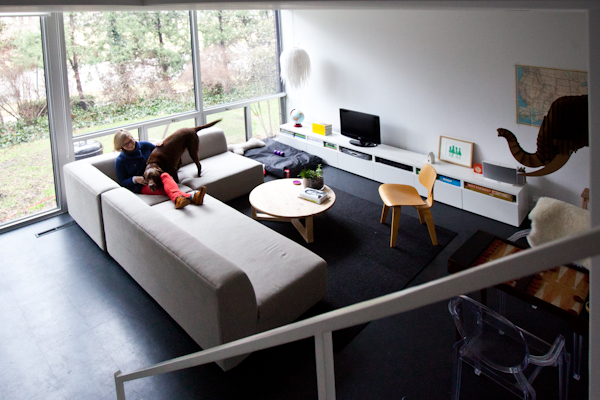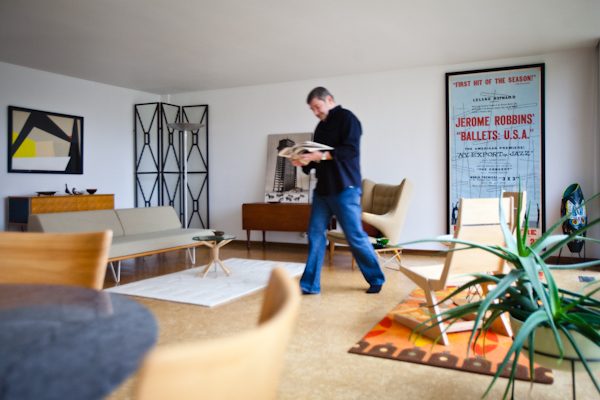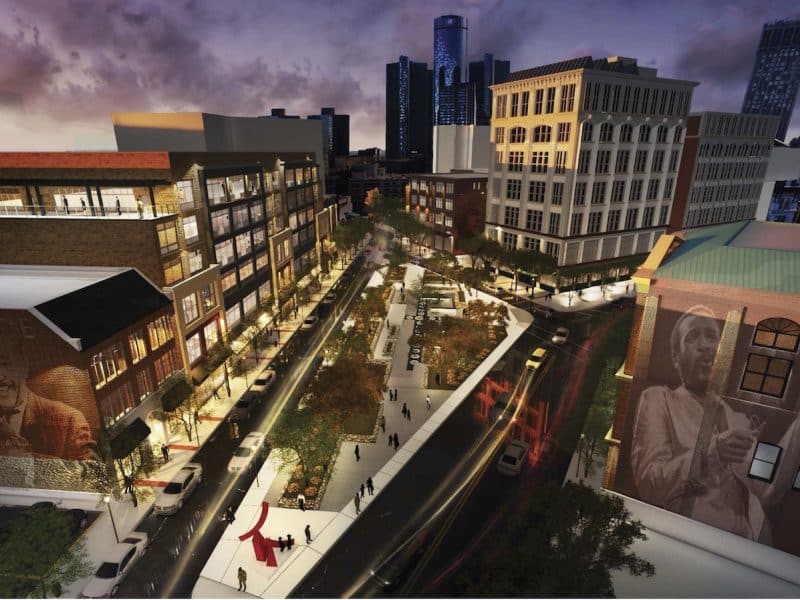Imported to Detroit: Overcoming culture shock with a little help from new friends
Newcomers to Detroit share many of the same growing pains, says Sarah F. Cox, a 2011 transplant from Brooklyn. But the kindness of strangers pointing people in the right directions helps to overcome the disorientation of being in a strange new land. Just remember, everyone: you're welcome.
Imagine the following dialogue:
“So you are from here?”
“I live here.”
“But you are not from here?”
“Did I grow up here? No.”
“But your family is here now?”
“Oh, no. No one I am related to lives within 500 miles.”
“But you went to school here?”
“No. In Virginia. Then New York.”
“And you are not married to someone here.”
“Nope.”
“Then (dramatic pause): WHY?”
This is no conversation in particular but a composite of the same conversation I’ve had every week since I moved here in May and began the arduous process of explaining it. Detroit understands natives returning home, or people moving here for family, but not the random American urbanite taking an interest and deciding to plunk down for the hell of it. My explanations for why I moved here (I was ready for a change, cost of living was cheaper, I just thought I would see what the Midwest is about) are met with incredulity.
I often read the words “native Detroiter” in articles about local artists and wonder if that’s the only label that will ever matter if you want to be “authentic.” I have never seen “native,” emphasized so strongly within in a community. I am used to living in one big mixing pot of transplants. “What area code is THAT?” they ask when my phone number pops up. It’s the one that came with me from another state but I…live…here.
I have had moments where I felt that Detroit was on the witch-hunt for the faker; proving yourself seems to be a feat where the bar keeps getting raised. I can sympathize with annoyance that late arrivers like me benefit from a lot of work done to pave the way. I know things used to be harder and I have a lot less to put up with in 2012 than some of you all did a few years back. I am grateful. I know it was not easy.
Discussing this with other transplants, we’ve discovered the list of characteristics that will get you flagged as an outsider include out-of-state-degrees, foreign-made cars, vegetarianism, a suburban zip code, a fear of the Movement festival, apathy for the Auto show, and ignorance of scores/standings pertaining to Lions, Tigers, or Pistons. In New York, it seemed like there was a least one sports bar dedicated to every type of out-of-state team one might support. Here you can’t get them to switch one of the 25 TVs to a non-Michigan team. For the record, I’m not even concerned with sports; I just think we could all watch a little bit more of the rest of the country from time to time.
New cities are disorienting for everyone and even the best of them cause culture shock; those moments when you realize that what you once thought was the norm does not apply. For a transplant from Atlanta named Jason Turner, culture shock came as a quick lesson in crime prevention. He had his wallet stolen from a locker at the YMCA last winter when some thieves cut his lock and then knocked into him as he was re-entering the room after his workout. “The boldness and the desperateness of the crime was the most surprising part,” he told me at the office of his advertising job downtown at Goodby Silverstein Partners. Thankfully that newcomer mistake will not be made again.
Jason says he’s learned to be smarter about what he carries around in Detroit now that he’s logged more than a year of living here. Perhaps that sounds obvious to long-term residents, but Detroit does not come with a manual and people are creatures of habit; I am still working on the illogical Michigan notion that I should get in the right lane if I want to eventually be going left from an intersection.
Since Jason grew up in Youngstown Ohio, this is not his first dose of a rust belt city. He left Atlanta for Detroit in November 2010 and his wife, Erika, joined him in March along with their chocolate lab. And fortunately the confusing parts of being new faded away to reveal that Detroit is a surprisingly friendly place after all. In September, I talked to Jason and Erika in the Lafayette Park home they bought when they moved. Within the co-op community they’ve felt welcomed by the neighborhood and have grown particularly attached to their neighbors William Ferry and Richard Oosterom, whom Jason describes as tremendous resources. Bill and Richard are a couple that made their own big move, from LA to Detroit, four years ago and are always willing to fill you in on Detroit’s theater, art, restaurant and political scenes.
Jason admits he came to Detroit pretty much blind in October 2010, his first trip here, and found the city to be an odd mix of good energy and physical devastation. Back in the Fort Shelby neighborhood of Atlanta they had been able to walk everywhere and thought that Ann Arbor would be more amendable to that lifestyle. But Jason’s been surprised to find that Detroit is actually “a 14 minute city by bike.” Which means he’s been commuting to work downtown on two wheels instead of four when the weather is nice. This unexpected asset is one of those insider pieces of knowledge that come with time. Even in a hyper-connected Internet world, it is amazing what word of mouth can do to help a new resident settle in and sometimes the most important part is that welcoming gesture of a stranger.
Jason recalls the kindness of Leopold’s bookshop owner Greg Lenhoff who drew him a map of places to go when he stopped in on a slow day last winter. “That is all you need to join the club,” Greg said, meaning Jason was a real local now. But the initiation process happens in many steps. And it can often be two steps forward one step back at times.
When I talked to Jason’s neighbor Bill I wanted to know about his attitude on welcoming newcomers. He told me that being a good neighbor for him is about sharing information on what to do around town. “I think that regardless of where you live you tend to be a champion of it.” Which means he’s learned not to pay attention to the negative things people say and that negativity is not unique to Detroit; it was the same story in L.A. “In a large city you really like it or you really don’t. We lived in NYC too; we don’t miss it but we are happy to visit. We feel the same way about L.A. There is a lot of really cool under- the-radar stuff going on in Detroit and that is where the real changes happen.”
To give up a former city full of memories, friends, family and perhaps better weather, there is usually a big hook — the sort of magnetic, romantic draw that seals the deal. For Jason and Erika it was real estate: Jason’s real estate agent, Ryan Cooley, helped sell him on living in Detroit by revealing how incredibly inexpensive it was. Jason was initially thinking about a loft space but once he saw Lafayette Park, he could not imagine living anywhere else. Jason and Erika bought their home from the original owner, which meant having to rip out shag carpet from the 1970s, but also keeping little vintage delights like the original stovetop.
The opportunity to live in a home designed by Mies van der Rohe, for a middle class salary, is one of those Detroit oddities no one will ever recreate. His neighbor Bill Ferry concurs. In a phone call in October he told me his move “was about living in a Mies van der Rohe courtyard home. We had been following real estate.”
After several business trips to the area, he and Richard got a rental car and cruised through the neighborhood and they were sold. Four years later he is finding the community more age diverse — five younger couples have moved in during his residency. The neighborhood still boasts many retirees but that’s not a problem for Jason who enjoys their stories. He points out that Lafayette Park has retired lawyers, judges, schoolteachers, and social workers and he enjoys picking their brains on what Detroit was like 30 years ago.
Bill and Richard’s (and now Jason and Erika’s) affection for the uniqueness of Detroit real estate is my daily obsession, which became a job. I run Detroit Curbed, a real estate and development blog updated 8-10 times a day during the week. Even when I am pissed at Detroit (for canceling transit, crazy parking rules, and for skepticism of outsiders) this is what keeps me going.
Detroit does not have a one-size-fits-all ideal living situation. It has a diverse buffet of everything from co-ops to lofts, from mansions to bungalows, and we’re adding some redeveloped historic towers very soon. I read the listings every morning and I love sharing these with readers in Detroit and all over the country: this is the city where I will buy my first house. It’s an annoying place sometimes but it’s still a real estate dream for most. Get ready for more transplants because Curbed has readers in L.A. and New York and they are jealous of what you are paying to live here.
I look forward to being the good neighbor with the insider tips in a few years. I’ll tell them to go to things off the beaten path like St. Cece’s pub, ZamZam, and the Clique Diner. I’ll also tell them that “new resident distrust thing” wears off so they should just shrug and forget it. I hope I am right. Perhaps you can help.
When Sarah F. Cox is not editing Curbed Detroit she’s probably still blabbering about it at a bar in Corktown, Midtown, Ferndale, or Hamtramck.
All photographs © Marvin Shaouni Photography










